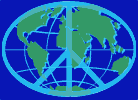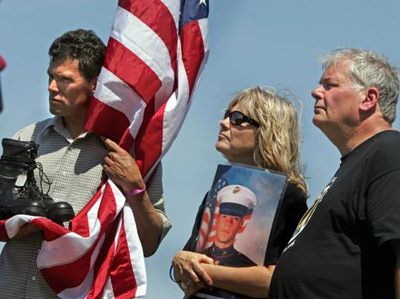
Merrimack
Valley People for Peace
Serving the communities of the Merrimack Valley
Memorial Day, 2008 copied
from Boston Globe 5/27/08
COMING
EVENTS
Weekly Vigils
Recent Events
30
Year History
NEWS/INFORMATION
Links to Resources
Radio
ACTION
Contact Government
Submit News or Events
Register to vote
Defend the Environment
ABOUT
MVPP
Contact MVPP
Join/Renew!
Why we still vigil
Letters to Editors
Officers
Newsletter (in
pdf)
| May
26, 2008 |
Rally's
veterans, activists seek to avoid
By
Scott Allen
Jeffrey Lucey was not counted among the 4,082 American troops who have died in the war so far, but, yesterday, veterans groups and peace activitists remembered the Marine Reserve lance corporal along with tens of thousands of others whose deaths are attributable to the wars in Iraq and Afghanistan. As sunbathers lolled on the grass of Christopher Columbus Park, protesters dropped a carnation into Boston Harbor for each of the 80 Massachusetts service men and women who died in the two conflicts, then tossed bouquets on the water for troubled veterans such as Lucey as well as the countless Iraqis who have died since the 2003 US invasion. "This government has steeped all of us . . . in a shroud of shame," said Kevin Lucey of Belchertown, who has filed a federal lawsuit against the Veterans Affairs secretary for failing to get his son the help that could have prevented his 2004 suicide. "Please help us stop it now." Organizers of the waterfront rally, including Veterans for Peace and Iraq Veterans Against the War, said they wanted an alternative way to mark Memorial Day from traditional "militaristic" parades and speeches that glorify war. For instance, President Bush yesterday talked about soldiers in Iraq who died "doing what they loved most: defending the United States of America." The reality, said Memorial Day for Peace organizers, is that troops and civilians alike are dying for Bush's foreign policy mistakes. Yet, despite opinion polls over the last two years that consistently show the majority of Americans oppose the five-year-old war, many protests draw small crowds. Only about 100 people, mostly veterans and veteran activists, turned up at the waterfront, drawing a few barbs from the speakers about all the people who view Memorial Day as little more than a day off from work. "It's indicative that the war is not touching people that much," said Nate Goldshlag of Veterans for Peace. The 35,000 dead and wounded are concentrated among military families rather than spread across the 300 million population, he explained, and no one is being asked to pay higher taxes to finance the war. As a result, he said, "The war is hidden from America." But the war is ever-present for Ian J. Lavallee, cochairman of the Boston chapter of Iraq Veterans Against the War. Lavallee, 24, stabbed himself in a men's room stall of New York City's Penn Station one drunken night after he returned from Iraq in December 2005. The military gave him an honorable discharge based on a pre-existing personality disorder, Lavallee said, but hasn't accepted his claim that the war drove him to a suicide attempt. Lavallee, who served in the 82d Airborne Division, said he was constantly pressured to be more brutal and aggressive. During his four months stationed west of Mosul, Lavallee said, he helped terrify Iraqi detainees, forcing them to eat pork against the teaching of Islam, humiliating them in front of their families, and even throwing them off trucks. "The things we were doing just encouraged more people to dislike us, not to want us there, and, frankly, try to kill us," said Lavallee, who said he "became a person that I never wanted to become." Now, Lavallee devotes himself to helping other veterans through his group, eking out a living on his $728-a-month government disability check. Lavallee argues that the government - not the troops - deserve the blame for incidents of brutality. "We all are capable of doing the best things or the worst things," he said. "Our soldiers are just reacting to a horrific crisis our government has put them in." Joyce Lucey said it was too late to save her son Jeffrey, who never recovered from the nightmares, depression, and substance abuse that plagued him after his service in Iraq. But she said many other veterans need more psychological and medical help than the government will provide. "War robbed them first of their innocence, then of their future," she said. Scott Allen can be reached at allen@globe.com.
|
|
___________________________________________________
Merrimack Valley
People for Peace meets monthly, on the fourth Tuesday,
at 7:30 pm, at
North Parish Church, North Andover.
(NOT DECEMBER)
Contact
Merrimack Valley People for Peace (978) 685-1389
P.O. Box 573
North Andover, MA 01845
Send material to post on the website to brian@quirk.ws
